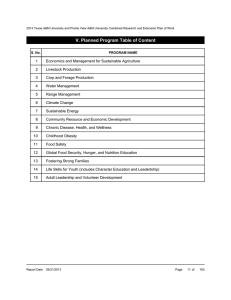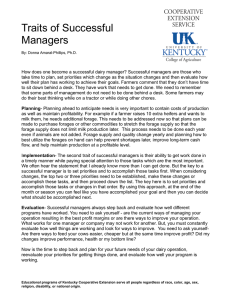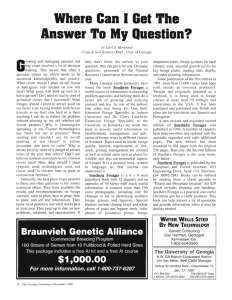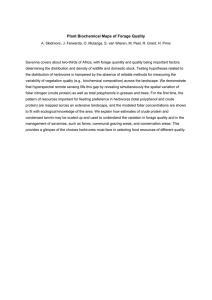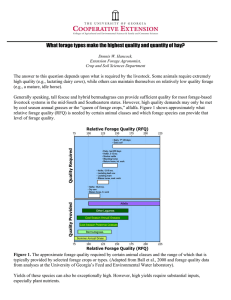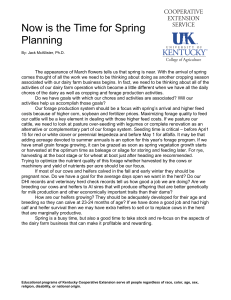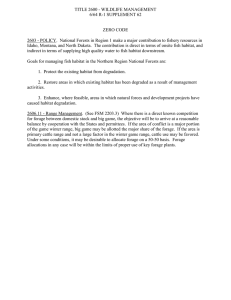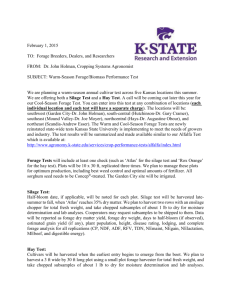U.S. Department of Agriculture Agricultural Research Service Forage and Range Research Laboratory
advertisement
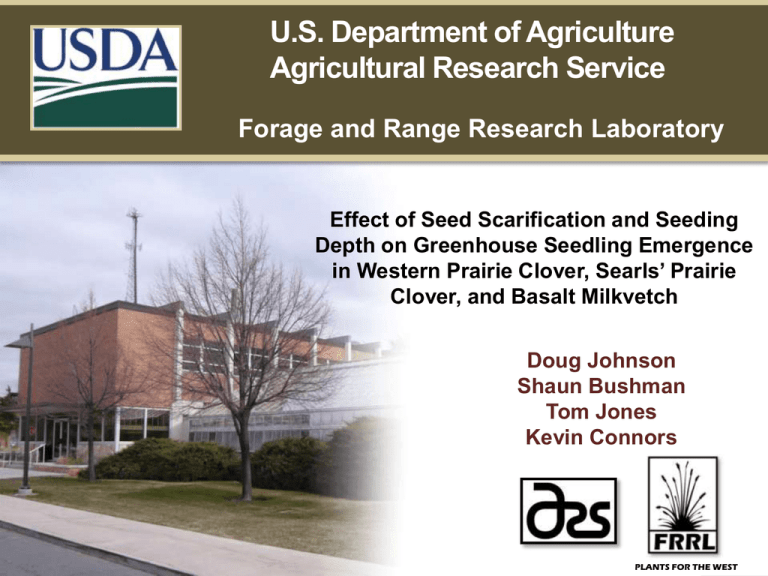
FORAGE AND RANGE RESEARCH LABORATORY PLANTS FOR THE WEST U.S. Department of Agriculture Agricultural Research Service Forage and Range Research Laboratory Effect of Seed Scarification and Seeding Depth on Greenhouse Seedling Emergence in Western Prairie Clover, Searls’ Prairie Clover, and Basalt Milkvetch Doug Johnson Shaun Bushman Tom Jones Kevin Connors PLANTS FOR THE WEST FORAGE AND RANGE RESEARCH LABORATORY USDA-ARS Forage and Range Research Lab (FRRL) Logan, Utah PLANTS FOR THE WEST Our Mission: Provide an array of improved plant materials and management alternatives for sustainable stewardship of rangelands and pastures in the western U.S. Scientists: Genetics/Plant Breeding (6) Molecular Biology (4) Physiology/Ecology (2) FORAGE AND RANGE RESEARCH LABORATORY Background PLANTS FOR THE WEST • Thousands of acres burn each year in the Great Basin and require revegetation. • Many land managers prefer a mix of diverse plant species for rangeland revegetation. • Very few North American legumes are available for rangeland revegetation in the Great Basin. FORAGE AND RANGE RESEARCH LABORATORY Need for Native Legume Species PLANTS FOR THE WEST Important for: • Nitrogen fixation • Seeding diversification • Wildlife habitat and grazing • Native pollinators • Highways and roads • Home xeriscaping We targeted three legume species native to western North America. FORAGE AND RANGE RESEARCH LABORATORY Basalt Milkvetch - Astragalus filipes (Asfi) PLANTS FOR THE WEST • Wide spread • Upright habit • Creamy, showy flower • Good seed production • No reports of toxicity FORAGE AND RANGE RESEARCH LABORATORY Western Prairie Clover - Dalea ornata (Daor) PLANTS FOR THE WEST • Northern GB • Upright habit • Purple, showy flower • Good seed production • No reports of toxicity FORAGE AND RANGE RESEARCH LABORATORY Searls’ Prairie Clover - Dalea searlsiae (Dase) PLANTS FOR THE WEST • Southern GB • Upright habit • Purple, showy flower • Good seed production • No reports of toxicity FORAGE AND RANGE RESEARCH LABORATORY Seedling Establishment: Critical Issue on Western Rangelands PLANTS FOR THE WEST Legumes typically have problems with: Hard seed (impermeable seed coat caused by physical and/or physiological mechanisms) Hardseededness: • Limits initial, uniform germination • Spreads germination over a long time period FORAGE AND RANGE RESEARCH LABORATORY Example of Hard Seed Analyses PLANTS FOR THE WEST Utah State Seed Lab (%) Seedlot Seed absorbing water Daor SB 2010 Dase EK 2010 Asfi NBR-1 2010 11 3 4 Viable hard seed (Tz) Total viable 73 84 95 84 87 99 FORAGE AND RANGE RESEARCH LABORATORY Objective PLANTS FOR THE WEST • Evaluate effects of seed scarification and seeding depth on seedling emergence in Daor, Dase, and Asfi to identify methods for enhancing seedling establishment FORAGE AND RANGE RESEARCH LABORATORY Six Seedlots Used in Study PLANTS FOR THE WEST Daor - SB 2009 - SB 2010 - SS 2009 - SS 2010 Dase - EK 2010 Asfi - NBR-1 2010 FORAGE AND RANGE RESEARCH LABORATORY Three Seed Treatments PLANTS FOR THE WEST 1) Acid Scarification • Soaked in concentrated sulfuric acid for 5 minutes • Rinsed seeds in tap water for several minutes • Dried the seeds 2) Sandpaper Scarification • Seeds rubbed between two pieces of 120-grit sandpaper 3) No Treatment FORAGE AND RANGE RESEARCH LABORATORY Experimental Design PLANTS FOR THE WEST Seedlots: Six Seed Treatments: Acid-scarified, sandpaper-scarified, NT Seeding Depth: 0.6 cm (¼ inch), 1.9 cm (¾ inch) Design: Randomized complete block, 4 reps, 2 runs FORAGE AND RANGE RESEARCH LABORATORY Procedures PLANTS FOR THE WEST Planted 50 seeds per row, covered seed with soil at two depths, and kept well watered Counted number of seedlings 12 times, Days 3-28: 2 runs Corrected counts on PLS basis (TZ test) FORAGE AND RANGE RESEARCH LABORATORY ANOVA Summary PLANTS FOR THE WEST Maximum Emergence (PLS Tetrazolium Basis) Factor df F value Depth 1 20.45 ** Seedlot (S) 5 263.45 ** Seed Treatment (T) 2 3,382.43 ** SXT 10 70.23 ** Depth X S 5 2.68 * Depth X T 2 0.12 NS Depth X S X T 10 2.21 * NS = not significant, * = P < 0.05, ** = P < 0.01 Sign. FORAGE AND RANGE RESEARCH LABORATORY Main Effects for Maximum Emergence PLS-Tz. PLANTS FOR THE WEST a 52 b 48 40 0.6 cm 1.9 cm 20 0 Planting Depth 100 Max. Emergence PLS-Tz. (%) Max. Emergence PLS-Tz. (%) 60 80 82 a b 72 60 Acid 40 Sand NT 20 c 0 Seed Treatment 13 FORAGE AND RANGE RESEARCH LABORATORY Seed Treatment Effects on Maximum Seedling Emergence PLS-Tz. PLANTS FOR THE WEST 120 100 ab ab abc a abc bc Max. Emergence PLS-Tz. (%) c d 80 d e Acid Sand NT 60 40 f g g 20 h h i j i 0 Daor SB 2009 Daor SB 2010 Daor SS 2009 Daor SS 2010 Dase EK Asfi NBR 2010 2010 FORAGE AND RANGE RESEARCH LABORATORY Rate of Seedling Emergence (Maguire, 1962) PLANTS FOR THE WEST Number of seedlings + . . . . . + Number of seedlings Days to first count Days to final count FORAGE AND RANGE RESEARCH LABORATORY Seed Treatment Effects on Rate of Seedling Emergence PLANTS FOR THE WEST Rate of Emergence (#/day) 10 a a a a a 8 b bc cd 6 d Acid d Sand 4 NT 2 e g fg f f h i i 0 Daor SB 2009 Daor SB 2010 Daor SS 2009 Daor SS 2010 Dase EK Asfi NBR 2010 2010 FORAGE AND RANGE RESEARCH LABORATORY Conclusions PLANTS FOR THE WEST • Daor, Dase, and Asfi have high levels of hardseed • Seedlings of Daor and Dase emerged well at both planting depths • Scarification greatly improved emergence in Daor and Dase, much less so for Asfi • Scarification appears necessary to maximize seedling emergence in Daor and Dase FORAGE AND RANGE RESEARCH LABORATORY Future PLANTS FOR THE WEST Compare Results of Greenhouse Studies to Actual Field Establishment Collaborative field establishment studies with: - Matt Horning (Clarno, Powell Butte, OR) - Clint Shock/Erik Feibert (Ontario, OR) FORAGE AND RANGE RESEARCH LABORATORY Additional Greenhouse Studies PLANTS FOR THE WEST Searls’ Prairie Clover Sand Clay/Sand FORAGE AND RANGE RESEARCH LABORATORY Two Releases for Western Prairie Clover PLANTS FOR THE WEST Majestic Germplasm Spectrum Germplasm Johnson, D.A., B.S. Bushman, K. Bhattarai, and K.J. Connors. 2011. Notice of release of Majestic germplasm and Spectrum germplasm western prairie clover. Native Plants Journal 12: 249-256. FORAGE AND RANGE RESEARCH LABORATORY Acknowledgements PLANTS FOR THE WEST Great Basin Native Plant Selection and Increase Project FORAGE AND RANGE RESEARCH LABORATORY PLANTS FOR THE WEST U.S. Department of Agriculture Agricultural Research Service Forage and Range Research Laboratory Doug Johnson Phone: (435) 797-3067 Email: doug.johnson@ars.usda.gov PLANTS FOR THE WEST FORAGE AND RANGE RESEARCH LABORATORY Combining Genetic/Ecological and Performance Considerations PLANTS FOR THE WEST Genetics/Ecology: • Genetic background • Species compatibility Field Performance: • High seed production • Vigorous seedlings • Competitive ability Plants that: • Establish, compete, and persist • Stabilize the site • Have affordable, available seed FORAGE AND RANGE RESEARCH LABORATORY Two New Western Prairie Clover Releases: Majestic, Spectrum PLANTS FOR THE WEST 1) Made seed collections across 25 sites FORAGE AND RANGE RESEARCH LABORATORY Common-Garden Field Data PLANTS FOR THE WEST 2) Conducted Evaluations at Two Common Garden Sites • Flowering date • June biomass • Plant height • Plant vigor score Two years of data collection • Seed yield • Fall regrowth • Forage quality FORAGE AND RANGE RESEARCH LABORATORY PLANTS FOR THE WEST 3) Genetic Diversity Structure Determined For The Three Legume Species • DNA procedures (AFLP) were used to determine the genetic diversity structure for each of the three legume species. • Results from DNA analysis allowed grouping of collections with similar genetic background. FORAGE AND RANGE RESEARCH LABORATORY Majestic Germplasm Western Prairie Clover PLANTS FOR THE WEST Johnson, D.A., B.S. Bushman, K. Bhattarai, and K.J. Connors. 2011. Notice of release of Majestic germplasm and Spectrum germplasm western prairie clover. Native Plants Journal 12: 249-256. Grower partners: BFI Native Seeds, L&H Seed, Ron Bitner/Paul Beckman FORAGE AND RANGE RESEARCH LABORATORY Spectrum Germplasm Western Prairie Clover PLANTS FOR THE WEST Johnson, D.A., B.S. Bushman, K. Bhattarai, and K.J. Connors. 2011. Notice of release of Majestic germplasm and Spectrum germplasm western prairie clover. Native Plants Journal 12: 249-256. Grower partners: BFI Native Seeds, L&H Seed
